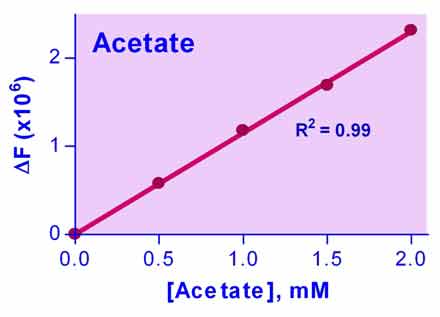EnzyChrom™ Acetate Assay Kit
Application
- For quantitative determination of acetic acid or acetate and evaluation of drug effects on acetate metabolism.
Key Features
- Sensitive. Use as little as 10 µL samples. Detection range: 0.20 to 20 mM acetate for colorimetric assays and 0.13 to 2 mM for fluorimetric assays.
- Simple. The assay involves adding a single working reagent, incubation for 30 min at room temperature, and read.
- Convenient and high-throughput. Homogeneous “mix-incubate-measure” type assay. Can be readily automated on HTS liquid handling systems for processing thousands of samples per day.
Method
- OD570nm, or FL530/585nm
Samples
- Serum, plasma, food, agriculture, and environment
Species
- All
Procedure
- 30 min
Size
- 100 tests
Detection Limit
- 0.13 mM
Shelf Life
- 6 months
More Details
Acetate is a common anion and fundamental to all forms of life. When bound to coenzyme A, it is central to the metabolism of carbohydrates and fats. It is acid form, acetic acid, is produced and excreted by acetic acid bacteria, such as Acetobacter genus and Clostridium acetobutylicum, which are found universally in foodstuffs, water, and soil. Acetic acid is also a component of the vaginal lubrication of humans and other primates, where it appears to serve as a mild antibacterial agent. Acetic acid is the main component of vinegar and is extensively used in food, dyes, paints, glue, and synthetic fibers. BioAssay Systems assay uses enzyme-coupled reactions to form a colored, fluorescent product. The color absorbance at 570nm or fluorescence intensity at 530nm/585nm is directly proportional to the acetate concentration in the sample.No frequently asked questions for this new product. Please check back later.
For more detailed product information and questions, please feel free to email us. Or for more general information regarding our assays, please refer to Technical Support.
Park, S., et al (2020). Intradialytic acid-base changes and organic anion production during high versus low bicarbonate hemodialysis. American Journal of Physiology. Renal Physiology, 318(6), F1418-F1429. Assay: Acetate in human plasma, serum and dialysate.
Balmer, M. L.,et al (2020). Memory cd8+ t cells balance pro- and anti-inflammatory activity by reprogramming cellular acetate handling at sites of infection. Cell Metabolism, 32(3), 457-467.e5. Assay: Acetate in human peritoneal fluid.
Danes, M. a. C., et al (2020). Post-ruminal supplies of glucose and casein, but not acetate, stimulate milk protein synthesis in dairy cows through differential effects on mammary metabolism. Journal of Dairy Science, 103(7), 6218-6232. Assay: Acetate in cow plasma.
Inagaki, T., & Matsuura, K. (2018). Extended mutualism between termites and gut microbes: nutritional symbionts contribute to nest hygiene. The Science of Nature, 105(9-10), 52. Assay: Acetate in termite gut content.
Smith, W. B., Gibson, S., Newman, G. E., Hendon, K. S., Askelson, M., Zhao, J., & Thadhani, R. I. (2017). The dynamics of the metabolism of acetate and bicarbonate associated with use of hemodialysates in the ABChD trial: a phase IV, prospective, single center, single blind, randomized, cross-over, two week investigation. BMC Nephrology, 18(1), 273. Assay: Acetate in human blood.
Cuervo-Soto, LI et al (2015). Identification of a novel carbohydrate esterase from Bjerkandera adusta: Structural and function predictions through bioinformatics analysis and molecular modeling. Proteins: Structure, Function, and Bioinformatics 83(3): 533-546. Assay: Acetate in microbe culture.
Garrido D et al (2013). Utilization of galactooligosaccharides by Bifidobacterium longum subsp. infantis isolates. Food Microbiol. 33(2):262-70. Assay: Acetate in microbe cell.
To find more recent publications, please click here.
If you or your labs do not have the equipment or scientists necessary to run this assay, BioAssay Systems can perform the service for you.
– Fast turnaround
– Quality data
– Low cost
Please email or call 1-510-782-9988 x 2 to discuss your projects.

$449.00
For bulk quote or custom reagents, please email or call 1-510-782-9988 x 1.
Orders are shipped the same day if placed by 2pm PST
Shipping: On Ice
Carrier: Fedex
Delivery: 1-2 days (US), 3-6 days (Intl)
Storage: -20°C upon receipt
Related Products
You may also like…
| Name | SKU | Price | Buy |
|---|---|---|---|
| QuantiChrom™ Zinc Assay Kit | DIZN-250 | $499.00 | |
| QuantiFluo™ Ammonia Assay Kit | DNH3-200 | $199.00 | |
| QuantiChrom™ Sulfate Assay Kit | DSFT-200 | $389.00 | |
| QuantiChrom™ Phosphate Assay Kit | DIPI-500 | $369.00 | |
| QuantiChrom™ Calcium Assay Kit | DICA-500 | $399.00 | |
| QuantiChrom™ Chloride Assay Kit | DICL-250 | $349.00 | |
| QuantiChrom™ Copper Assay Kit | DICU-250 | $499.00 | |
| QuantiChrom™ Iron Assay Kit | DIFE-250 | $439.00 | |
| QuantiChrom™ Magnesium Assay Kit | DIMG-250 | $429.00 | |
| QuantiChrom™ Chromium Assay Kit | DCRM-250 | $479.00 |
Why BioAssay Systems
Quality and User-friendly • Expert Technical Support • Competitive Prices • Expansive Catalogue • Trusted Globally
